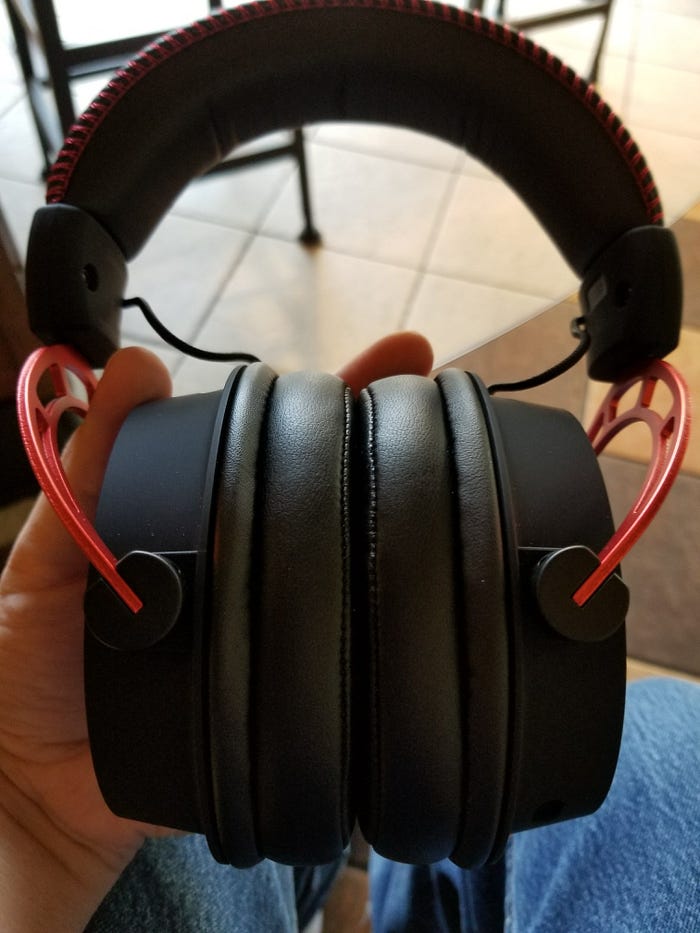$99 Gaming Headset Showdown: HyperX Cloud Alpha VS Sennheiser GSP 300
It’s Wednesday, and it’s time for the headset showdown!
Today, it’s my two current favorite $99 gaming headsets, the HyperX Cloud Alpha, and the Sennheiser GSP 300.
Which one is OBJECTIVELY BETTER? (Because we all know how “objective” this hobby clearly is, right?)
OVERVIEW
The Sennheiser GSP 300 and the HyperX Cloud Alpha are both $99.

Sennheiser’s GSP 300 launched late last year and comes in multiple colors. The cable doesn’t detach. The mic doesn’t detach. It boasts having exceptional comfort, sound quality, isolation, and mic quality.

HyperX’s Cloud Alpha launched earlier this year. The followup to the popular Cloud II, it now has a detachable cable. The mic also detaches. The drivers were redesigned to use a “dual chamber” system, promising better audio quality than ever before.

SOUND QUALITY
This is a tough one that’s going to come down to personal taste. So here’s what I think.
Imagine a continuum, with neutral in the middle, bass-heavy on the left, and treble-heavy on the right.
The GSP 300 would be just to the right of the center, and the Cloud Alpha would be just to the left of center.
The Cloud Alpha has better-extended, slightly more powerful bass response. Mids are about even on both models. Highs ring through slightly more sharply on the GSP 300.
Both of these headsets provide exceptional clarity and detail for the price, and for being “Gaming” products. Both have a solid sense of soundstage and imaging.
I think the Cloud Alpha is more fun to listen to thanks to its slight warmth. I also think it’s a little more forgiving of badly compressed material.
Overall these are within about 15 percent of each other. They both sound great. I just slightly prefer the bass impact of the Cloud Alphas…and I wager that most other users would as well.
If you already own the GSP 300’s though, you’re all set. Don’t go throw them in a river or sell them or anything. You could probably achieve a Cloud Alpha-like response with a little EQ.
WINNER: Cloud Alpha by a hair for its fun, even bass response that doesn’t ruin the details.

COMFORT/ISOLATION
You can’t go wrong with either of these, comfort-wise.
HyperX filled their ear pads and their headband pad with memory foam. It’s soft and cushy and sits gently on your head.
The ear pads have a decent amount of room inside, though the holes aren’t as deep as those on the GSP 300 so you might feel them touching your ears a bit.
Sennheiser also used memory foam on the GSP 300’s ear pads, and the cups are angled inside so they won’t touch your ears. That’s a small point in favor of the Sennheiser model.
Where HyperX earns that point back is with their leatherette. The leatherette coverings on the Cloud Alpha ear pads are easily the softest I’ve ever felt. They also don’t heat my ears up as quickly as the average leatherette ear pad.
If you wore both of these headsets for an hour, you’d find more ear sweat on the GSP 300’s when you were done.
Both headsets isolate very well and seal nicely against the head. The GSP 300 is slightly more isolating, but not enough that you’d notice the difference outside of an A/B test.
So…what’s more important to you? Ear sweat or isolation?
WINNER: TIE

DESIGN
The GSP 300 looks sort of goofy and angular. It’s right in line with other gaming headsets. It provides plenty of room for VR headsets thanks to its bowed out design, but this also helps make it look a bit silly.
I still like how it looks, but I have to mention this in today’s world where there’s a pile of stylish headphones to consider.
HyperX stuck with the classic Beyerdynamic/Takstar Pro 80 studio look for the Cloud Alphas. They look like a completely normal set of headphones. You can wear them in public and no one will even know you’re using a “gaming” product.
The GSP 300 is available in a variety of colors. The Cloud Alpha is currently only available in traditional HyperX Black and Red.
HyperX’s headset has some nice little touches like stitching on the headband, rubberized plastic on the sides of the cups, and a braided cable.
I don’t hate the goofy design of the GSP 300, but I like the look and premium touches of the Cloud Alphas more. If I could remove the mic from the GSP 300’s, they’d win back some style points.
WINNER: Cloud Alpha

BUILD QUALITY
Both headsets are built very well. But the Cloud Alphas use a lot of metal.
Sennheiser’s build quality is no slouch in spite of the plastic everywhere. The headband adjustments are nice and firm, and none of the parts feel thin or cheap. It’s totally good for this particular price point.
The Cloud Alphas are just a bit better. They have a fully aluminum frame for both the headband and the gimbals holding the ear cups. The backs of the ear cups are also sandblasted aluminum. This does make the Cloud Alphas a touch heavier, but the memory foam headband is more than up to the task of the extra weight.
I don’t think either of these will break during regular use. But I think the materials on the Cloud Alpha are one notch nicer.
WINNER: Cloud Alpha

MICROPHONE
Sennheiser’s mic is a bit better, unless you’re in a loud esports situation.
I never am, so there’s that.
I was hard on the Cloud Alpha mic in my review, not because it was bad, but because it’s not that much better than HyperX’s earlier mics. It provides a good level of background noise isolation, but the tone is just a bit tinny and nasally. It’s clearly been prioritized for voice chat above all other things.
Sennheiser’s mic is a bit more resonant and natural in its tone. So it has a slight edge, even though it’s not as flexible or positionable.
WINNER: GSP 300

FEATURES/EXTRAS
HyperX has always excelled at throwing extras in the box. The Cloud Alpha includes a detachable cable, a detachable mic, a long extension/splitter cable, and a decent cloth bag. The cable is nicely braided and tangle-free. The pouch is okay, but not that special.
The inline controls on the cable work well, with a nicely smooth volume control and easy to use mic mute switch.
Sennheiser’s GSP 300 is a little light on features. The cable doesn’t detach (though if you step up to the $139 GSP 350, that model has a detachable cable). The mic doesn’t detach, though you can flip it up to mute. The cable is a rubbery material and sort of prone to tangling. Sennheiser used a split cable by default and includes a 4-pole combination adapter.
The volume wheel on the GSP 300’s ear cup is easier to reach than the in-line wheel on the Cloud Alphas, and it’s nice and smooth.
HyperX has been consistently outdoing the competition on extras for years now, and this time it’s no different.
WINNER: Cloud Alpha

FINAL WINNER: HyperX Cloud Alpha
With a sound signature that perfectly mixes clean studio sound and fun bass response, a detachable braided cable, a classic design, and soft ear pad materials, the HyperX Cloud Alphas eek out a win.
But the GSP 300’s offer slightly better mic quality, a little more isolation, and a little more room for your ears. They also have an extremely capable sound that I might prefer depending on my mood that particular day. So if those things are important to you, then the GSP 300 is still a good choice.
It’s that darn doofy look and non-detachable mic that break it for me a little. If I could buy a version of the GSP 300’s that didn’t have the mic attached, I’d do it in a heartbeat because they’d be a great office/studio headphone for all day work critical music listening.
I guess since the Cloud Alphas exist, I don’t really need that imaginary product. But I’d still buy it to set on the shelf between these two. Because I’m a weird person.
Thanks for reading!
